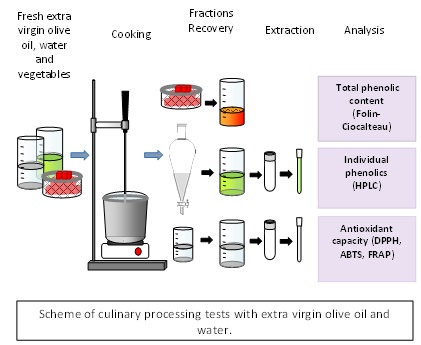Extra virgin olive oil, water, and water/oil mixture (W/O) were used to fry, boil and sautée Mediterranean vegetables. We determined the variations between unused and used water and oil for the contents of total (TPC) and individual phenolic compounds measured by HPLC, and the antioxidant capacity (AC) by DPPH, FRAP and ABTS methods. The highest TPC value was found in water used to boil tomato, whereas the lowest in the EVOO from the W/O used for boiling potatoes. The TPC decreased in the processed EVOO, whereas the water was enriched after boiling. After processing, the concentrations of phenols exclusive to EVOO diminished with differentiated behavior, from complete elimination of hydroxytyrosol and tyrosol after sautéeing and W/O boiling, to conservation of pinoresinol. The transfer of phenols such as chlorogenic, gallic, dihydroxybenzoic, hydroxybenzoic and hydroxyphenylacetic acids, as well as luteolin, apigenin and vanillic acid from the vegetable to the oil was frequent when eggplant, tomato and pumpkin were cooked. The cooking water was enriched in most of the phenols analysed, as the case of chlorogenic acid and phenols exclusive to EVOO after W/O boiling. The values of AC in the fresh oil decreased or were maintained after being used to cook the vegetables. With some exceptional increases in the oil used for frying (p<0.05). The cooking techniques were classified in decreasing order according to the AC as follows: raw>deep frying>sautéing>boiling. This pattern was more consistent with DPPH results (from potato, eggplant and pumpkin) than in those of ABTS (pumpkin) and FRAP (eggplant). The water fraction recovered from boiling was enriched in Trolox equivalents being higher when EVOO was added. Phenolic content and AC in the EVOO decreased after cooking Mediterranean Diet vegetables, whereas the water was enriched after the boiling processes, particularly when oil was included.

